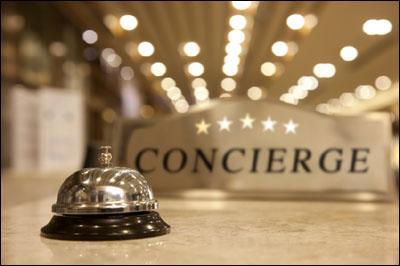 | « Back to article | Print this article |
The soft power that India ignores
The spin-offs from providing some sort of formal training for the hospitality business are huge, writes Kanika Datta.
In parrying overtures from the Tata group, the management of US-based Orient Express Hotels may imply otherwise, but if there is one thing at which India can justly claim to outstrip global standards by miles it is the quality of service in the domestic hospitality business.
This applies across the board. If we exclude flights on government-owned Air India, each one of which remains memorable for its uniform awfulness, the service on privately owned airlines, from full-service to low-cost, is noticeably superior to comparable services overseas. Personnel in five- and three-star hotels, from housekeeping and bellboys to the manager, could offer many of their global counterparts some useful lessons in manners and attitude.
Yet depressingly, India doesn't even count among the world's top tourist destinations. The World Economic Forum's Asean Travel and Tourism Report for 2012 ranks India a lowly 68 among 139 countries (China is at 39). Of course, these rankings are based on the state of tourism infrastructure in each country and count such factors as safety, health and hygiene and so on. That is why relatively boring countries like Switzerland (at number one) and Singapore (at 10), where borderline rudeness and cold professionalism appear to be the lingua franca, score way above India.
Reams have been written on the parlous state of India's tourism infrastructure mainly in the context of the enormous diversity of natural beauty (beaches, mountains, forest, desert, rivers) and historical monuments (from 3000-odd BC onwards) on offer.
But there's a much more compelling reason for doing so: with a ready-made asset base like the one above, tourism can be much more transformative for India than the BPO business or manufacturing because it has the capacity to turn two of the biggest challenges we face into the opportunity. These are an under-educated population and the enormous hindrances in land acquisition.
Barring gourmet chefs and higher management staff, hospitality does not require high-level education, not even a university graduation; a high school degree can suffice and, lower down the service chain (like housekeeping, kitchen helps and so on), even rudimentary education up to mid-school will do. Unlike manufacturing, skill development in hospitality does not totally exclude the semi-literate.
Also, hospitality remains a labour-intensive business in perpetuity no matter what the advances in technology. This is an important issue in a country with a large and growing population, the bulk of which appears to emanate from India's less developed states.
Therefore, the spin-offs from providing some sort of formal training for the hospitality business are huge. The travel and tourism business already supports 25 million jobs, significantly higher than the 2.8 million in the IT-BPO sector (as of FY 2012).
Also, doing so is also easier than establishing the ambitious Industrial Training Institutes that lie at the cornerstone of our manufacturing policy and have yielded limited success. Certainly, setting up hotels, restaurants and airlines has its own set of issues - of the kind that figure in the World Bank's Doing Business, but which local businessmen have learned to tackle with admirable skill and forbearance. But these businesses rarely entail acquiring vast tracts of land from poor tribals or farmers that almost inevitably run into dangers of compensation and political opportunism.
No hotelier is likely to suffer the fate of Singur, nor has the industry faced the kind of opposition that foreign retailers are up against. The government declared tourism a high-priority industry and allowed 100 per cent foreign direct investment (FDI) through the automatic route. But the sector accounted for just a little under two per cent of FDI between April 2000 and June 2012, according to a Cushman and Wakefield-CII report.
Astonishingly, one of the major deterrents to faster growth (apart from the usual suspects) is a shortage of skilled manpower. According to the C&W-CII report quoting a tourism ministry study, the current supply of skilled or professionally trained manpower (that is from both government and private programmes) is estimated to be a "dismal" 8.92 per cent of the industry's total requirement.
The proliferation of private sector training institutes, of widely varying quality, is testimony to this rising demand - and the central and state governments have added their very small mite to this effort. Only a slightly harder push will help more innately hospitable Indians climb out of the ranks of the poor.

